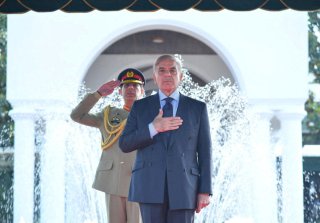Post-Khan Pakistan: New Prime Minister Pursues Unity Government
Over forty Pakistani politicians have been appointed to Sharif’s cabinet—with most originating from the Pakistan People’s Party or the Pakistan Muslim League-Nawaz, Sharif’s party.
Shehbaz Sharif, Pakistan’s interim prime minister following the removal of his predecessor, Imran Khan, appointed Bilawal Bhutto-Zardari to the position of foreign minister on Wednesday, solidifying an uneasy alliance between the leaders of Pakistan’s two major political parties.
Bhutto-Zardari, the son of former Pakistani leaders Asif Ali Zardari and Benazir Bhutto, is the leader of the Pakistan People’s Party (PPP), the country’s main liberal party. Bhutto’s maternal grandfather, Zulfikar Ali Bhutto, led Pakistan during the 1970s until his overthrow and execution at the hands of the military in 1979. Benazir Bhutto, Pakistan’s first female leader, led the country during the late 1980s and mid-1990s; she was assassinated while campaigning for prime minister in 2007, an election she was widely expected to win.
After his appointment, Bhutto-Zardari claimed in a Twitter post that he had been “honored” and humbled by the appointment. He vowed that the new government and the PPP would “play our part in restoring democracy, passing electoral reforms, fighting for a fairer economy and advocating Pakistan’s case on the world stage.”
At thirty-three, Bhutto-Zardari is one of the youngest foreign ministers in the world, and he has been placed in charge of overhauling the country’s foreign policy, including charting a stable relationship with Pakistan’s neighbor and historic adversary India, and improving ties with the West while ensuring good relations with China—a delicate balancing act that previous leaders, including Khan, have struggled to maintain.
The new foreign minister’s first foreign trip is slated to take place today, when he will accompany Sharif to Saudi Arabia for a trade mission. The prime minister’s office indicated that the two officials’ meetings would “focus on advancing economic, trade and investment ties and creation of greater opportunities for the Pakistani workforce in Saudi Arabia.”
During the trip, Sharif is expected to appeal to Saudi Arabia’s king and crown prince for economic assistance, as Pakistan’s economy has struggled since the onset of the COVID-19 pandemic.
In addition to Bhutto-Zardari, forty other Pakistani politicians have been appointed to Sharif’s cabinet—with most originating from the PPP or from the Pakistan Muslim League-Nawaz (PMLN), Sharif’s party. Sharif is also the scion of a prominent political family; his older brother, Nawaz Sharif, served three separate terms as prime minister. The elder Sharif’s most recent term ended in 2017 after Pakistan’s Supreme Court removed him from office over allegations of corruption stemming from the “Panama Papers” leak.
Trevor Filseth is a current and foreign affairs writer for the National Interest.\
Image: Reuters.

